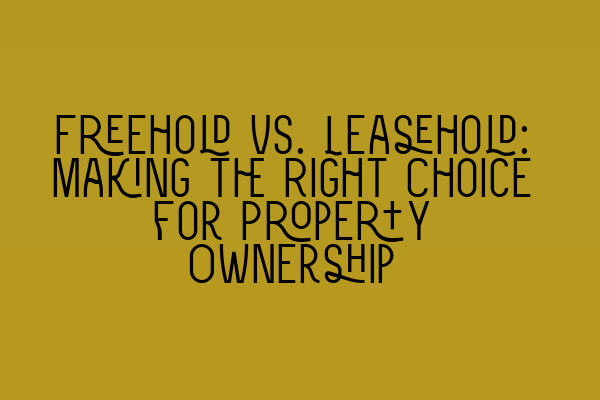Freehold vs. Leasehold: Making the Right Choice for Property Ownership
When it comes to purchasing a property in the UK, one of the most important decisions you’ll have to make is whether to opt for freehold or leasehold ownership. Both options have their advantages and disadvantages, and it’s crucial to understand the differences between them before making a decision.
In this article, we’ll explore the key features of freehold and leasehold ownership and help you make an informed choice that suits your needs. But first, let’s define these two terms:
What is Freehold Ownership?
Freehold ownership refers to owning both the property and the land it’s built on. When you purchase a property as a freehold, you become the outright owner, and you have complete control over the property and the land.
One of the major advantages of freehold ownership is that you don’t have to pay ground rent or service charges to a landlord. You have the freedom to make any alterations or modifications to the property (subject to planning permissions) and can enjoy long-term ownership without any restrictions.
However, it’s worth noting that with freehold ownership, you are solely responsible for the maintenance and repair of the property, including any communal areas if applicable. This means you have full control but also bear the financial burden of upkeep.
What is Leasehold Ownership?
Leasehold ownership, on the other hand, involves owning the property for a fixed period of time while leasing the land from the freeholder. The landowner, also known as the freeholder, grants a lease to the leaseholder for a specific number of years, which can vary widely.
Leasehold ownership is most commonly associated with flats and apartments, where multiple units are owned within a single building or development. In this case, service charges are usually payable to cover the maintenance and management costs of shared spaces, such as hallways and gardens, overseen by a management company or a residents’ association.
While leasehold ownership provides a more affordable entry point into the property market, it also comes with certain obligations and restrictions. Leaseholders must adhere to the terms set out in the lease agreement, which may include seeking permission for alterations to the property, paying ground rent, and abiding by various regulations.
Factors to Consider
Now that we’ve covered the basics of freehold and leasehold ownership, let’s delve into the factors you should consider when making a decision:
Longevity of Ownership:
Freehold ownership offers long-term security, as you have indefinite ownership of the property. However, leasehold ownership is limited to the duration specified in the lease agreement. If you’re looking for a stable, long-term investment, freehold ownership might be the better option.
Flexibility and Control:
With freehold ownership, you have the freedom to modify and adapt your property to suit your preferences without seeking permission from a landlord. On the other hand, leasehold ownership may require you to obtain consent for significant alterations. Consider how important it is for you to have control over your property and make improvements without restrictions.
Financial Considerations:
Freehold properties generally have a higher upfront cost compared to leasehold properties. However, leasehold properties often come with additional costs, such as ground rent and service charges. Consider your budget and the long-term financial implications before making a decision.
Maintenance Responsibilities:
As a freeholder, you have full responsibility for the maintenance and repair of the property. In a leasehold arrangement, the maintenance and upkeep of communal areas are usually addressed by service charges paid by the leaseholders. Factor in your willingness and ability to manage the maintenance responsibilities before choosing between freehold and leasehold ownership.
Lifestyle and Future Plans:
Think about your lifestyle and future plans when deciding between freehold and leasehold ownership. If you anticipate changing your living arrangements in the near future or require flexibility, leasehold ownership might be more suitable. However, if you prefer stability and the freedom to modify your property as desired, freehold ownership is likely the better choice.
Conclusion
Choosing between freehold and leasehold ownership ultimately depends on your personal preferences, financial situation, and long-term goals. It’s essential to carefully consider the advantages and disadvantages of each option and seek legal advice if necessary.
If you’re interested in learning more about property law and staying updated on the latest changes and implications, check out our related article on Updates in UK Property Laws: Key Changes and Implications. For a comprehensive guide on legal challenges in property transactions, take a look at Legal Challenges in Property Transactions: A Comprehensive Guide.
If you’re navigating lease laws in the UK as a tenant or landlord, our article on Navigating Lease Laws in the UK: Essential Guidelines for Tenants and Landlords can provide you with essential guidelines. And for those looking to ace their property law exams, don’t miss our article on Dominate Property Law Questions: Avoiding Common Pitfalls and our useful tips for exam preparation in Land Law Revision Tips: Ace Your Exam Preparation.
We hope this article has helped you gain a better understanding of the freehold vs. leasehold debate. If you need further assistance or have any questions about property ownership, get in touch with our team at SQE Property Law & Land Law. We’re here to guide you through the legal aspects of property transactions and ensure you make the right choice for your needs.
